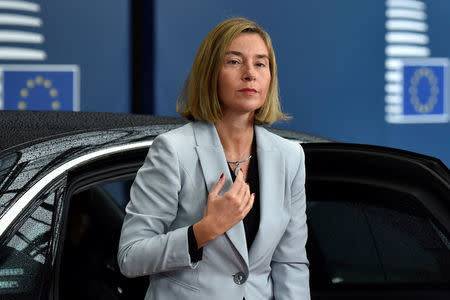EU urges Western Balkan nations to improve cooperation

By Gabriela Baczynska and Ivana Sekularac BRUSSELS (Reuters) - The European Union's top diplomat Federica Mogherini urged six Western Balkan leaders on Wednesday to overcome differences and work better together as they move towards joining the bloc. Mogherini will host the leaders of Serbia, Albania, Macedonia, Montenegro, Bosnia and Kosovo over a dinner in Brussels later on Wednesday, part of the EU's recently revived efforts to work more closely with the region. The EU has been alarmed by growing tensions in the Western Balkans and believes Russia has played a destabilising role in the region, still scarred by the wars that tore Yugoslavia apart in the 1990s along ethnic and religious lines. Moscow denies meddling in the region. "I invited ... the six Western Balkan partners to share with them the state of play on the situation in the region, the way ahead, how the EU can strengthen opportunities and perspectives for good neighbourly relations in the region," Mogherini said. "(To) increase cooperation among them and between each one of them and the EU," she said, adding that the six must also focus on political and economic reforms. Mogherini was speaking days after a months-long political stalemate was broken in Macedonia, where Social Democrats won a mandate to form a government with ethnic Albanians, and in Albania itself, where opposition ministers joined the government to prepare elections. The EU has lobbied hard for both these moves, which followed months of worrying developments that also included heated exchanges between Serbia and Kosovo, and Montenegro blaming Russia for plotting to stall its accession to NATO. Bosnian Prime Minister Denis Zvizdic told reporters: "EU membership is a common goal for all six countries." "The most important thing is that we maintain peace and stability in the region. This evening at dinner we are going to discuss a series of regional projects, especially in energy infrastructure." While EU officials privately admit the bloc - increasingly engulfed with its own problems - has been focussing less on the Western Balkans, they say the six countries also still have plenty of homework to complete if they are ever to join. "They always come and say 'The Russians are coming'. Yes, that puts them back on the radar but it is not enough to make them member states," said one EU official. "You have to be able to build agreements in your own country, in your region, if you think of moving towards the EU. The region must mature, grow up to be ready to deal with problems in the future. The EU process requires compromises." (Writing by Gabriela Baczynska; Editing by Gareth Jones)

 Yahoo News
Yahoo News 